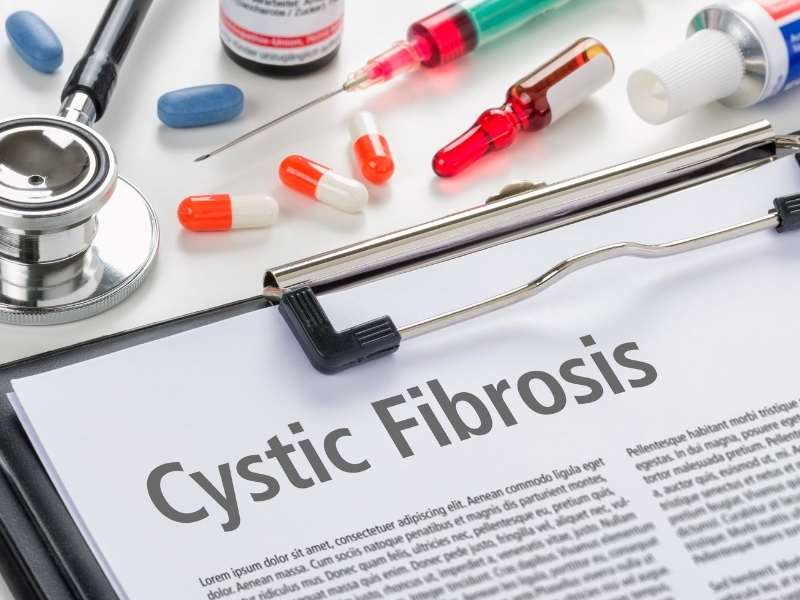What Is The Most Common Cause Of Cystic Fibrosis?

What Is The Most Common Cause Of Cystic Fibrosis?
Many people are curious about what the most common cause of cystic fibrosis is. This article will help to answer your questions in a way that helps you gain a better understanding of the disorder.
Cystic fibrosis (CF) is a genetic disorder that affects the lungs and digestive system. It is caused by a mutation in the CFTR gene, which regulates salt and water movement in and out of cells. This mutation causes thick, sticky mucus to build up in the lungs, pancreas, and other organs. The most common cause of cystic fibrosis is a defective gene inherited from one or both parents. In this blog post, we will take a comprehensive look at the most common cause of cystic fibrosis!
The Most Common Cause Of Cystic Fibrosis
The most common cause of cystic fibrosis is an issue with a gene inherited from one or both parents. This defect can be caused by a number of mutations in the CFTR gene, including:
-A mutation in the promoter region that reduces the amount of CFTR protein produced
-A deletion or insertion of genetic material in the CFTR gene
-A change in the sequence of DNA building blocks (base pairs) in the CFTR gene
These mutations can prevent salt and water from moving out of cells, which leads to thick, sticky mucus build-up. The mutations can also affect other organs, such as the pancreas, liver, and kidneys. Cystic fibrosis is a life-long condition that requires ongoing treatment. There is no cure for cystic fibrosis, but treatments are available to help manage the symptoms.

Other Causes Of Cystic fibrosis
Although the most common cause of cystic fibrosis is a defective gene inherited from one or both parents, there are many other different causes of cystic fibrosis as well. Most cases are caused by a combination of genetic and environmental factors.
PRO TIP: You can learn more about the disorder and pharmaceutical resources available to you by reaching out to your local agency. NJSOCF – New Jersey State Organization of Cystic Fibrosis – offers financial and pharmaceutical resources to individuals dealing with this disorder. You can contact to them here for more information on available resources in New Jersey. You can also learn more about the disorder here.
Other common causes of cystic fibrosis include:
• Genetic Mutations– Cystic fibrosis is a genetic disorder that can be passed down from parents to children. For example, if one parent has the CFTR gene mutation, there is a 25% chance that their child will also have cystic fibrosis. The chances go up, of course, if both parents possess the defective gene.
• Environmental factors – Exposure to cigarette smoke, pollutants, and other toxins can increase the risk of developing cystic fibrosis.
• Infections – Cystic fibrosis can be caused by a variety of infections, including bacteria, viruses, and parasites. One of these is a bacteria called Pseudomonas aeruginosa. These are strains of bacteria that are widely found in the environment and are a major cause of lung infections in people with cystic fibrosis.
• Immune system problems – The immune system plays a vital role in regulating the flow of salt and water in and out of cells. When it is not working properly, it can lead to cystic fibrosis since it is not combating potential infections as effectively as it could if it were working properly.
• Pancreas problems – The pancreas helps to digest food and produce enzymes that break down proteins, fats, and carbohydrates. If the pancreas is not functioning properly, it can lead to cystic fibrosis. Pancreatitis, which overconsumption of alcohol can cause, can aggravate already existing symptoms of cystic fibrosis, making the condition much more uncomfortable to deal with.
• Poor Nutrition: Poor nutritional habits can also be a contributor as the symptoms of cystic fibrosis can become more exaggerated without the extra consumption of calories. The extra calories bring in more energy that people with cystic fibrosis need. It helps them breathe a bit more easily, fight lung infections, and help compensate with poor digestion, another symptom of cystic fibrosis.
• Intestinal blockages – Blockages in the intestines can prevent nutrients from being absorbed into the body, which can lead to cystic fibrosis.
• Defective CFTR protein – Sometimes, the CFTR gene mutation occurs even if both parents do not have Cystic Fibrosis. This may be due to a defect in the CFTR protein, which can also lead to cystic fibrosis.
• Prenatal problems – Cystic fibrosis can be caused by a variety of prenatal problems, including genetic abnormalities, low birth weight, infections, and exposure to toxins.
• Early-onset CFTR protein – In some cases, the CFTR gene mutation occurs spontaneously before birth. This is known as early-onset CFTR protein, and it can also lead to cystic fibrosis.
There are many different causes of cystic fibrosis, but most cases are caused by a combination of factors that can end up increasing the likelihood of developing the disorder.
Conclusion: What Is The Most Common Cause Of Cystic Fibrosis?
If you or a loved one has been diagnosed with cystic fibrosis, it is important to learn about the most common cause of this condition, as it can help you better understand the situation. Talk to your doctor or genetic counselor about your family history and find out if you may be at risk for CF. Early diagnosis and treatment can help improve the quality of life for people with CF.
Organizations such as The New Jersey State Organization of Cystic Fibrosis are dedicated to helping people dealing with this disorder in a multitude of ways. You can make a donation here.
We hope you now understand what is the most common cause of cystic fibrosis and wish you all the best.

Comments